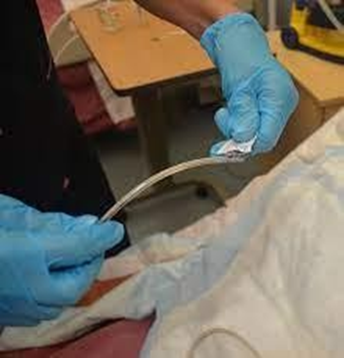A nurse is caring for a client who is postoperative following a bowel surgery and has an NG tube connected to low intermittent suction. Which of the following assessment findings should indicate to the nurse that the NG tube might not be functioning properly?
Wall suction set to 60 mm Hg
Drainage fluid is greenish-yellow
Aspirate pH of 3
Abdominal rigidity
The Correct Answer is B
A. The wall suction setting does not directly indicate the functioning of the NG tube.
B. Greenish-yellow drainage fluid may indicate the presence of bile in the stomach, suggesting
that the NG tube is not adequately draining gastric contents, which could indicate a malfunction.
C. An aspirate pH of 3 indicates gastric acidity, which is expected in the stomach and does not necessarily indicate a problem with NG tube function.
D. Abdominal rigidity may suggest intra-abdominal pathology but does not specifically indicate NG tube dysfunction.

Nursing Test Bank
Naxlex Comprehensive Predictor Exams
Related Questions
Correct Answer is C
No explanation
Correct Answer is B
Explanation
A. The examination light of the ophthalmoscope should be directed toward the client's eye, not the client's face.
B. When examining the left eye, the nurse should stand on the right side of the client to facilitate proper alignment of the ophthalmoscope with the client's eye.
C. Dimming the lights in the room may improve visualization of the client's internal eye
structures, but it is not typically necessary for ophthalmoscopic examination and may hinder the nurse's ability to assess the client effectively.
D. Placing the ophthalmoscope directly against the client's forehead would not facilitate proper examination of the internal eye structures and may cause discomfort to the client.
Whether you are a student looking to ace your exams or a practicing nurse seeking to enhance your expertise , our nursing education contents will empower you with the confidence and competence to make a difference in the lives of patients and become a respected leader in the healthcare field.
Visit Naxlex, invest in your future and unlock endless possibilities with our unparalleled nursing education contents today
Report Wrong Answer on the Current Question
Do you disagree with the answer? If yes, what is your expected answer? Explain.
Kindly be descriptive with the issue you are facing.
